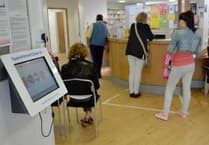It comes as the number of people taking the drugs, which relieve symptoms of the menopause, reached a record high across England.
The doctor in charge of women's health across the NHS said more people are now aware of issues around the menopause, but more must still be done to "reduce inequalities in access".
NHS figures show 66,697 patients in the NHS Surrey Heartlands Integrated Care Board area received HRT treatment in the year to March.
This was an 11% increase on the year before, and more than in any year since 2016-17, when current records began.
Across England an estimated 2.6 million people were taking HRT in 2023-24, up 12% from the previous year, and more than double the figure in 2016-17.
The number of NHS prescriptions for HRT has also risen to a record high, with 13 million items prescribed in 2023-24, a 22% increase on the year before.
In the Surrey heartlands there were approximately 326,000 individual prescriptions issued, at a total cost of £5.7 million.
This has more than trebled since 2016-17, when it cost £1.5 million.
HRT replaces the hormones oestrogen, progestogen, or both in women going through the perimenopause or menopause.
It can relieve menopause symptoms such as anxiety, insomnia and hot flushes, and is often administered as gels, creams, tablets and patches.
Media coverage of the menopause has increased in recent years, with several high-profile celebrities speaking out on the issue and how it has affected them.
Nationally, patients aged 50 to 54 were most likely to be prescribed HRT, with 640,000 people in this age group accounting for almost a quarter of all patients on HRT in 2023-34.
The wealthiest parts of England also had more than twice as many patients receiving HRT compared to the most deprived areas.
Dr Sue Mann, NHS national clinical director for women’s health, said the rise in prescriptions "reflects the sharp increase in menopause awareness".
She added HRT "can make a real difference to women going through the menopause", and said it’s encouraging to see millions of women feeling supported to talk about and access care.
"It’s vital that all women have equal access to support and are fully informed about the risk and benefits of the different therapies available," Dr Mann said.
"We know there is more work to do to increase awareness and reduce inequalities in access, and that’s why we’re rolling out women’s health hubs to provide extra care within communities as well as tools to help women to manage their symptoms."


.jpeg?width=209&height=140&crop=209:145,smart&quality=75)
.jpeg?width=209&height=140&crop=209:145,smart&quality=75)